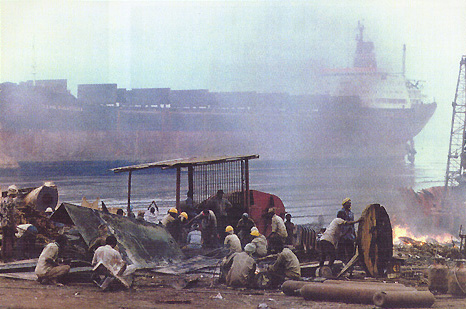
Greenpeace Press Release
However its implications reach far beyond India because similar conditions are known to exist in other shipbreaking states, particularly Pakistan, Bangladesh, the Philippines, China and Vietnam. The analyses of samples taken from Alang and Mumbai, revealed the presence of high levels of heavy metals, potentially cancer-causing polycyclic aromatic hydrocarbons (PAHs), the toxic biocide tributyl tin (TBT) and asbestos. German occupational health specialist Dr. Frank Hittal estimates that every fourth worker in Alang must be expected to contract cancer due to the lack of safeguards in handling the contaminants. "This report proves that ships do contain hazardous substances, which are subsequently released into the environment when the ships are broken, and that the workers do indeed suffer as a result," said Nityanand Jayaraman, Greenpeace's toxics campaigner in India. "Citizens' groups have raised the issue of hazards in the shipbreaking industry with the Ministry of Environment. But, the government has maintained a sphinx-like silence. We hope the Ministry realises the gravity of the situation and acts rapidly to set things right." All the toxic substances found by Greenpeace on ships-for-scrap are hazardous wastes covered under the Basel Convention. Prevailing Indian legislation, international law and European Union regulations expressly prohibit the sending of hazardous ships-for-scrap containing these contaminants to India (or other industrialising Asian countries) for breaking. Shipbreaking and the export of ships-for-scrap are issues that straddle several international fora and agreements, including the International Maritime Organisation, the Basel Convention and the International Labour Organisation. Along with our partners from the Basel Action Network (BAN) and trade unions, we intend to ensure that the export of ships-for-scrap is no longer used as a loophole to dump toxic wastes on developing countries," said Andreas Bernstorff, Greenpeace Germany's toxics campaigner. While the goal is to ensure that ships are decontaminated prior to export to Asia, the report identifies asbestos handling and flame-torch cutting of steel plates as the two most significant areas of immediate concern. Because the surface of ship steel contains heavy metal-based paints, salts and organic compounds, high-temperature torch-cutting exposes workers to highly hazardous, and cancer-causing fumes that contain dioxins and polycyclic aromatic hydrocarbons. Asbestos handling and torch-cutting are both highly hazardous activities strictly regulated in industrialised countries. In Germany, for instance, only fully protected personnel operating under the supervision of highly skilled specialists are allowed to perform these operations. For the ships that are already in Asia, this practice should be immediately enforced by the Asian governments in the interest of their workers' health," said Judit Kanthak, a chemical engineer and toxics campaigner with Greenpeace Germany who authored the report. "Contamination by highly persistent organic compounds, such as the toxic biocide tributyl tin and the deadly dioxin, is a real and present threat. Even if activities were stopped at these sites, the high concentrations of some of these toxins in the sediment and subsequent release into the environment will ensure ongoing contamination at these sites for decades," concluded Kanthak. ENDS For more information or interview requests in German, Hindi and English, please contact: Nityanand Jayaraman/Andreas Bernstorff/Judit Kanthak on + 91 11 4313458, fax: +91 11 4310651.
Notes to editors: The Basel Ban, which is part of the international Basel Convention on Control of Transboundary Movement of Hazardous Wastes, prohibits the export of hazardous wastes from countries that are members of the Organisation of Economic Cooperation and Development (OECD) to non-OECD countries. The OECD consists of industrialised countries. Since 1 January, 1998, the Basel Ban is a constituent part of the European Community Regulation (EEC) No. 259/93 of 1 February 1993 on the supervision and control of shipments of waste within, into and out of the European Community, as last amended on 6 November 1998. Ships for scrap that are contaminated with asbestos, arsenic, PCBs, heavy metals and TBT paints are prohibited for export to non-OECD countries from European Union member countries. The Indian Supreme Court decided on 5 May 1997 that: "No import should be made or permitted by any authority or any person of any hazardous waste which is already banned under the Basel Convention or to be banned hereafter with effect from the date specified therein." The International Maritime Organisations has regulations concerning virtually all aspects of the shipping industry. The one aspect -- shipbreaking -- that has the most destructive potential is yet to enter the IMO's regulations. FAIR USE NOTICE. This document contains copyrighted material whose use has not been specifically authorized by the copyright owner. The Basel Action Network is making this article available in our efforts to advance understanding of ecological sustainability and environmental justice issues. We believe that this constitutes a `fair use' of the copyrighted material as provided for in section 107 of the US Copyright Law. If you wish to use this copyrighted material for purposes of your own that go beyond `fair use', you must obtain permission from the copyright owner. More News |
|
|